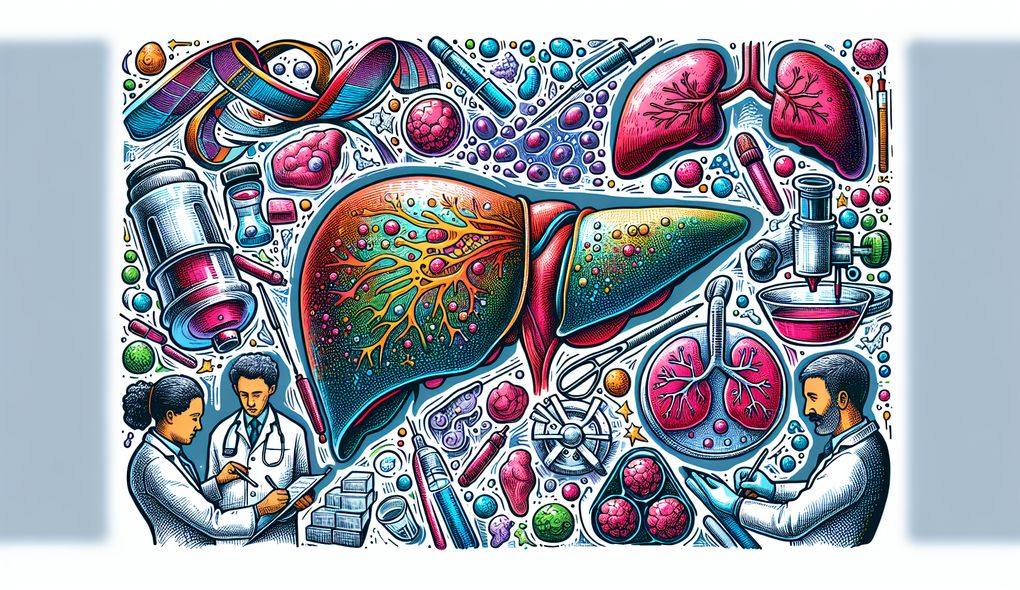What is your approach to developing integrated treatment plans for patients with complex liver diseases?
SENIOR LEVEL

Sample answer to the question:
My approach to developing integrated treatment plans for patients with complex liver diseases is to first gather all necessary information about the patient, including their medical history, current symptoms, and diagnostic test results. I would then collaborate with a multidisciplinary team consisting of hepatologists, gastroenterologists, radiologists, and surgeons to discuss the best course of treatment. We would consider all available treatment modalities, including medication, lifestyle modifications, and surgical interventions. Regular follow-up visits and monitoring would also be a crucial part of the treatment plan to ensure its effectiveness and make any necessary adjustments.
Here is a more solid answer:
My approach to developing integrated treatment plans for patients with complex liver diseases begins with a comprehensive assessment of the patient's condition. I thoroughly review the patient's medical history, conduct a physical examination, and review the results of diagnostic tests such as liver function tests, imaging studies, and biopsies. This allows me to gather all relevant information and understand the specific aspects of the patient's liver disease. I then collaborate closely with a multidisciplinary team, including hepatologists, gastroenterologists, radiologists, and surgeons, to develop a tailored treatment plan. Communication is key in this process, and I ensure that all team members are involved in discussions and decision-making. We consider various treatment modalities, including medication, lifestyle modifications, and surgical interventions, depending on the patient's condition. Regular follow-up visits are crucial to monitor the effectiveness of the treatment plan and make any necessary adjustments. Throughout this process, I stay up to date with the latest research and medical literature in hepatology, allowing me to apply evidence-based practices and continuously improve patient care.
Why is this a more solid answer?
The solid answer expands on the basic answer by providing specific details and examples of the candidate's approach to developing integrated treatment plans for patients with complex liver diseases. It demonstrates the candidate's expertise in the required skills and qualifications, including understanding hepatobiliary diseases and treatments, proficiency in performing hepatologic procedures and interpreting diagnostic tests, excellent communication skills, ability to work collaboratively in multi-disciplinary medical teams, and conducting research and critical analysis of medical literature. However, it could still benefit from further elaboration and specific examples to highlight the candidate's experience and achievements in these areas.
An example of a exceptional answer:
Developing integrated treatment plans for patients with complex liver diseases requires a comprehensive and patient-centric approach. I begin by thoroughly reviewing the patient's medical history, including previous treatments and outcomes, to gain insights into their specific needs and challenges. I then conduct a detailed physical examination and order specific diagnostic tests to further assess the extent and severity of the liver disease. This comprehensive evaluation allows me to collaborate effectively with a diverse team of specialists, including hepatologists, gastroenterologists, radiologists, and surgeons. Together, we discuss and analyze the available treatment options, considering factors such as the patient's disease stage, comorbidities, and preferences. We prioritize evidence-based practices and the latest advancements in hepatology to develop personalized treatment plans. Effective communication with the patient and their family is vital throughout the process. I ensure that complex medical information is communicated in a clear and empathetic manner, addressing any concerns or questions they may have. Regular follow-up visits enable me to closely monitor the treatment's effectiveness, adjust the plan as needed, and provide ongoing support to patients. Additionally, I actively engage in research, regularly reviewing medical literature, attending conferences, and participating in clinical trials to stay up to date on cutting-edge treatments and strategies. This allows me to continuously improve my practice and contribute to the field of hepatology.
Why is this an exceptional answer?
The exceptional answer provides a detailed and comprehensive response to the question, highlighting the candidate's expertise and proficiency in developing integrated treatment plans for patients with complex liver diseases. The answer addresses the evaluation areas specified in the job description, demonstrating the candidate's expert understanding of hepatobiliary diseases and treatments, proficiency in performing hepatologic procedures and interpreting diagnostic tests, excellent communication skills for discussing complex medical information, ability to work collaboratively in multi-disciplinary medical teams, and skilled in conducting research and critical analysis of medical literature. The answer also showcases the candidate's patient-centric approach, evidence-based practice, and commitment to continuous learning and improvement. It provides specific details and examples to support the candidate's claims and aligns well with the requirements and responsibilities outlined in the job description.
How to prepare for this question:
- Familiarize yourself with the latest research and advancements in hepatology, including treatment modalities and evidence-based practices.
- Reflect on your past experiences and achievements in developing treatment plans for patients with complex liver diseases. Prepare specific examples to demonstrate your expertise and patient-centered approach.
- Practice effective communication skills, particularly in explaining complex medical information to patients and their families.
- Sharpen your multidisciplinary collaboration skills by working with other healthcare professionals on case discussions and treatment planning.
- Stay up to date with medical literature, attend conferences, and consider participating in clinical trials to enhance your knowledge and contribute to the field of hepatology.
What are interviewers evaluating with this question?
- Expert understanding of hepatobiliary diseases and treatments
- Proficient in performing hepatologic procedures and interpreting diagnostic tests
- Excellent communication skills for discussing complex medical information with patients and families
- Ability to work collaboratively in multi-disciplinary medical teams
- Skilled in conducting research and critical analysis of medical literature

